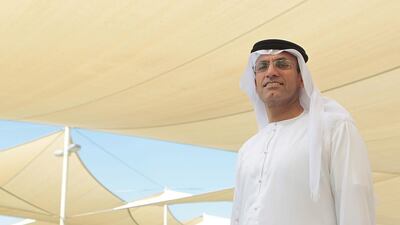Khaled Suleiman Al Blooshi is seemingly always on some kind of mission. When the major in the UAE armed forces is not serving in Afghanistan, he is diligently trying to decipher old manuscripts and writings on anything related to the UAE.
“I want to document and record our country’s history as much as I can,” says Al Blooshi, who has a doctorate in the modern history of Abu Dhabi from Saint Joseph University in Lebanon and teaches modern history at the University of Abu Dhabi.
He has had a passion for history since childhood, when he was more interested in listening to old people tell their stories than playing with children his own age.
“The stories from the past are just so amazing. Both the positive and the negative ones. We learn from each story and, from each, experience the old values and what has changed,” he said.
The 45-year-old Emirati, who has served in the army for 20 years, has managed, despite his stressful and often demanding career, to write and publish a book, with a second one on the way.
His first book, Abu Dhabi During the Era of Zayed The First (1855-1909), was published in English this year with a special Al Nahyan Family Tree pull-out inside. The Arabic version of the book was published in 2006.
“It took so long to get the English version out, as it is difficult finding the right translations for some of the references in the book, and I was working on my PhD as well,” he said.
The first book is Al Blooshi's master's thesis, and the second will be his doctoral dissertation put together in a reader-friendly format. The second book will focus on the "foundation years: 1892 to 1971". The books will be available in public libraries and book stores in the UAE, or can be found via www.makarem.ae.
“What you will find new in my books is the role that Sheikh Zayed the First had in education, by introducing it to Abu Dhabi, as well as the path to unification of the Emirates. It began with him, and our late president, Sheikh Zayed bin Sultan Al Nahyan, continued on the same path and achieved the different goals set up by Sheikh Zayed The First as well as his own goals and dreams,” he said.
The researcher admits he avoided sensitive topics such as borders and tribal feuds, making only general references to them in his work. But he included all his references, both the Arabic and English, in great detail, as well as the backgrounds of the different tribes.
“One of the biggest challenges to researchers in the country is actually finding the research material. There is a lack of cooperation from the different research centres and when you go to a library, they ask you what book you want, when they should be offering the list of relevant books to the research request,” said Al Blooshi. “It was so frustrating, where at times I would wait half a year for a copy of a piece of paper or manuscript.”
Al Blooshi travelled across the UAE, Saudi Arabia, Qatar and to the United Kingdom and met some of the older expats who once lived here to produce a well-rounded account of events. Finding Arabic references and documents remains one of the biggest challenges, as they have not been properly archived or preserved.
“We have lost so much in the Arab world over the past few decades. The great libraries of the great Arab capitals have deteriorated, and so we end up relying on the British archives and what the West had saved and translated,” he said.
In addition to difficulties in finding references and research material, Emirati researchers have been denied access to certain figures.
“Sometimes a foreigner would get more access than a local,” he said.
Al Blooshi hopes that one day the history of the Arab world can be written honestly, without fear of upsetting someone.
“We would hear that it is not the right time to write this or that and then we lose the actual information,” he said. “So many important historic figures have died, and we haven’t documented their story properly with just a few oral stories here and there. It is a real shame, as we have some really amazing stories.”
During one of his meetings he spoke with an older Emirati man who travelled to school on a donkey, and sometimes a friend’s camel.
“He told me one time he went to the school inside a tent, where a religious cleric would be a teacher, a mutawa, and he held up a torn piece of paper which was his homework and he said to him that the camel ate his homework,” laughs Al Blooshi.
“If we put these stories in history books, more people, especially the young, would read them.”
Rym Ghazal is a senior features writer for The National.

